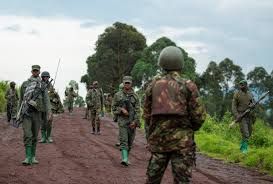
M23 withdraw from peace Talks with Congo amid Sanctions
The M23 rebel group backed by Rwanda has withdrawn from peace talks with the Congolese government which were scheduled to begin this week in Angola’a capital,Luanda. The group’s spokesman, Lawrence Kanyuka, cited international sanctions imposed by the European Union on several M23 members as the primary reason for their withdrawal stating that the sanctions have rendered the dialogue “impracticable.” Kanyuka also highlighted ongoing military offensives by Congo’s army in the conflict-torn region as a contributing factor undermining the potential for successful talks.
“The consequences of these sanctions and the continued offensives against us mean our organization can no longer continue to participate in the discussions,” Kanyuka stated in a press release.
Despite M23’s withdrawal, the Congolese government expressed its commitment to the dialogue in Angola. A delegation had already traveled to Luanda vowing to proceed with discussions aimed at resolving the ongoing conflict in eastern Congo. Tina Salama, spokesperson for President Felix Tshisekedi, confirmed the delegation’s presence.
The conflict escalated significantly in January when M23 rebels advanced capturing the important city of Goma and later Bukavu in February. Angola which has taken on a mediatory role in the conflict had planned to facilitate direct negotiations between the two parties starting Tuesday.
Previous peace talks between Congo and Rwanda were abruptly canceled in December after Rwanda insisted on direct negotiations with M23 which Congo flatly rejected. Tshisekedi characterized dialogue with the group as a “red line” during a speech to the diplomatic corps earlier this year.
M23 is among approximately 100 armed groups competing for control in eastern Congo, a region rich in minerals and situated near the Rwandan border resulting in one of the most severe humanitarian crises globally where over 7 million people have been displaced due to the ongoing conflict.
International observers report that M23 receives support from around 4,000 Rwandan troops, and there have been threats from the rebels to advance towards Congo’s capital, Kinshasa.
In response to the ongoing violence and human rights abuses associated with the conflict, the United Nations Human Rights Council recently launched a commission to investigate allegations of atrocities committed by both sides.
Compounding regional tensions, Rwanda severed diplomatic relations with Belgium on Monday and expelled Belgian diplomats following Belgium’s suspension of development aid to Rwanda last month. Rwandan President Paul Kagame accused Belgium of attempting to destabilize Rwanda.
The EU imposed sanctions on five Rwandan nationals including the commander of Rwandan special forces in eastern Congo and four Congolese nationals affiliated with the M23 including its political leader Bertrand Bisimwa. These sanctions extend to Rwanda’s sole gold refinery, Gasabo Gold Refinery which the EU accused of engaging in “illegal extraction and trafficking” of natural resources from eastern Congo.
The eastern region of Congo is not only rich in gold but also holds significant deposits of critical minerals used in smartphone and computer production. According to a UN report, M23 generated approximately $300,000 monthly from its control of a mining area in eastern Congo last year.
Meanwhile, the U.S. State Department expressed interest in developing a partnership in the mining sector in Congo confirming preliminary discussions have begun. President Tshisekedi met with U.S. Special Envoy to Congo, Rep. Ronny Jackson, on Sunday to explore potential security and economic collaborations emphasizing the need for peace to attract American investment in the Democratic Republic of Congo.
